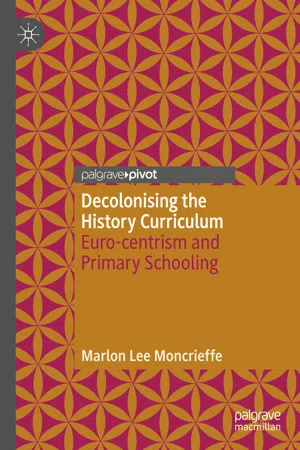Curriculum, Eurocentrism and Whiteness
The Key Stage 2 primary school history curriculum (DfE 2013) for teaching and learning is framed by Eurocentric aims and contents dominated by ‘Whiteness’ (Eddo-Lodge 2017; Di Angelo 2011; Frankenburg 1993). I am speaking about ‘Whiteness’ as a narcissistic existential orientation from which White people (some consciously, some unconsciously) view the world as a norm by which ‘the other’ (Said 1978) non-White person is judged. ‘White narcissism’ (Matias 2016) means White people seeing themselves only, as universal human beings who can represent all of human experience (Eddo-Lodge 2017; Delgado and Stefanic 2012; Di Angelo 2011; Gillborn 2008; Fanon 1963, 1967/2008; Bhabha 2004; Ladson-Billings 1998; McIntyre 1997; Frankenburg 1993; Said 1978).
Attention in this book is given to what I see as ‘Whiteness’ in the Key Stage 2 primary school history curriculum aims and contents. I see these aims and contents as ‘hegemonic’, where they direct primary school teachers to teach history for the purposes of cultural reproduction to their pupils through exclusive White-British stories of the past as relevant to knowing about present times, and the future. The ‘Whiteness’ that I see leads my concerns about structural racism functioning through the collective mindset of White-British teachers in primary school education. The dominant White-British teacher workforce in primary schools (DfE 2020) implementing their lesson planning and teaching uncritically and aligned to the same Eurocentric biases as the Key Stage 2 primary school history curriculum means that they reify and perpetuate ideological associations with knowledge, education, and progress through ‘Whiteness’ (Chantiluke 2018). This complicity with ‘Whiteness’ becomes so widespread (Eddo-Lodge 2017) that White-British teachers fail to even notice. The dominance of ‘Whiteness’ allows White pupils to see their backgrounds and perspectives as objective and representative of norms articulated by the curriculum, as opposed to non-White pupils who are disconnected by this exposure to British history (Charles 2019; Chantiluke 2018; Hawkey and Prior 2011; Smart 2010; Grever et al. 2008; Maylor et al. 2007; Traille 2007). This means that White pupils are positioned at an advantage in their learning about British history, in comparison to non-White pupils. This inequality of access to equitable knowledge through the formal national history curriculum is a major concern of this book.
Decolonising Curriculum Knowledge (Whiteness)
Modern society is based upon the hierarchies of Eurocentrism in which the creation of anti-Blackness is essential (Andrews 2018a, b). Decolonising the curriculum knowledge means to decentre the ‘Whiteness’ of Eurocentrism for dismantling racism and oppression (Milne 2019). Intervention and action to decolonise ‘Whiteness’ in curriculum, education, teaching and learning is not a new one (Bhambra et al. 2018). Anti-racist activism work through minority-ethnic groups and Black parents in Britain since the 1960s has included supplementary Saturday schools with Black-led, Black-centred and community-based education to counter intrinsic racial biases of the White-British education system (Chetty 2020; Race 2020; Chantiluke 2018; Andrews 2013). These schools emerged because of the failure by successive governments to encourage curriculum policies to combat cultural ignorance, ethnocentric attitudes and racism in society (Chantiluke 2018; Andrews 2013; Tomlinson 2005).
The campaign for decolonising the curriculum is a struggle that continues today across all phases of education. It has been amplified in the UK, particularly through the “Why is my Curriculum White Campaign?” in 2014 by students of University of College London, and the ‘Rhodes must fall’ campaign by students of University of Oxford (Charles 2019; Chantiluke et al. 2018; Sabaratnam 2017). Student grievances were directed at what Peters (2015, p. 641) describes as ‘the lack of awareness that the curriculum is comprised of ‘White ideas’ by ‘White authors’, and is a result of colonialism that has normalised Whiteness and made Blackness invisible’. Steinburg (2020) provides caution to this decolonial movement by suggesting that any acknowledgment given to the construct of a Eurocentric curriculum as the starting point for thinking about reinventing knowledge is in itself a colonial act. However, decolonising the curriculum means to cause ‘epistemic discomfort’ by decentring Whiteness through critical curriculum thinking (Harris 2020). This is a route to ‘epistemic innovation’ in teaching, learning and education for supporting praxis to move beyond the ‘colonial zero-point’ (Domínguez 2019).
Typologies for Decolonising the Curriculum
I see both possibilities and problems with decolonising the curriculum through my own conception of three types of thinking and action: the ‘revolutionary’ approach; the ‘radical’ approach; and, the ‘gestural-superficial’ approach.
A starting point for seeing and understanding the ‘revolutionary ’ approach is Andrews’ (2018a, b) paradigm of ‘Black radicalism ’. It is one in which he states a vision of ‘Blackness’ that would include ‘all of our cultural, social and representational forms rooted in providing for those suffering the worst oppression’ (Andrews 2018a, b, p. 297). He argues: ‘Freedom can only be found in overturning the Western imperial status quo’ (Andrews 2018a, b, p. 284). This perspective meets with Mazama’s (2003) presentation of Afrocentrism , a paradigm for seeing and knowing about the world and its history in opposition to Eurocentrism. This is a paradigm of thought which professes a canon of knowledge for the sake of liberation (Charles 2019; Mazama 2003) . Afrocentrism has been criticised for its essentialist discourses that echo the colonising Eurocentric ideologies that it seeks to dismantle (Joyce 2003).
A ‘radical’ approach to decolonising the curriculum through teaching and learning can be seen through ‘transformative critical multicultural...
